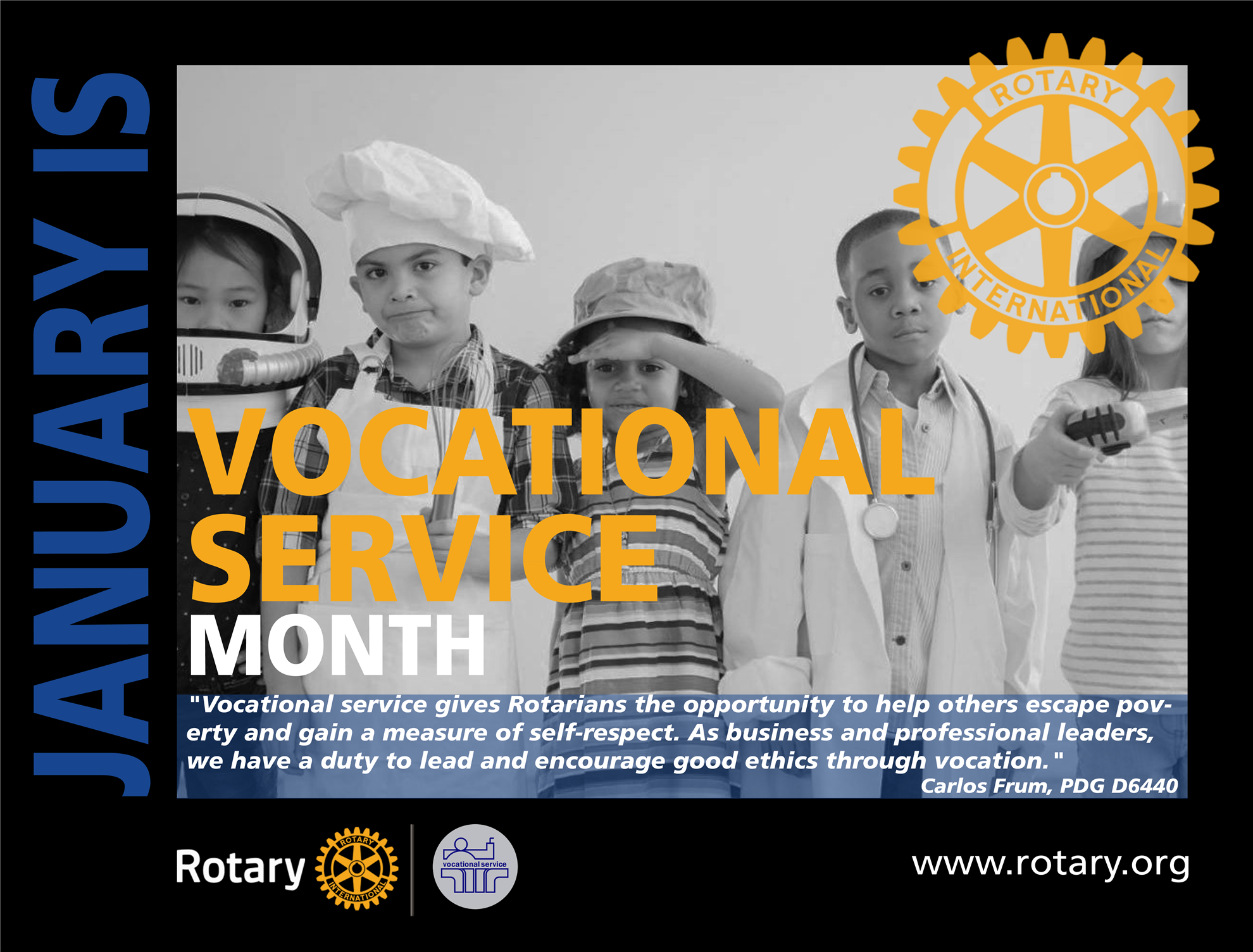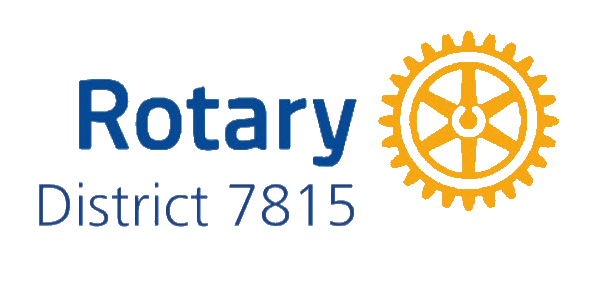
Start the year off with a focus on Vocational Service! Wait, what? What is Vocational Service anyway?
January is Vocational Service Month on the Rotary calendar. What exactly does that mean? Of Rotary’s five Avenues of Service – Club, Youth, Vocational, Community, and International – vocational seems to be more difficult to define and is sometimes forgotten. But… it is actually the heart of how Rotary started and continues to link to our Four Way Test and forms part of the essence of what Rotary is! How so, you ask? Business and professional life are still core aspects of Rotary, and Vocational Service is a major force in promoting honour, integrity, and trustworthiness in business – and in all that we think and do (sound familiar?)
A Short History Lesson
Originally, only one representative from each business or profession was invited to join a club because there was a mandated expectation of members doing business with each other and Paul Harris did not want members to compete against each other for other members’ business. The idea of “trade-boosting” was gradually eliminated and by 1912, Rotarians were no longer required to exchange business with one another. The “classification” system has evolved and now is useful as a way to consider professionals and areas of work that are not represented in a club so you can invite new members from those underrepresented areas. It is helpful to review a list of all professions, trades and areas of work in your community and to see if there are ones that are underrepresented in your club – including those who are working now and who are retired. Include people who are students and those whose work is non-paid too!
Originally, only one representative from each business or profession was invited to join a club because there was a mandated expectation of members doing business with each other and Paul Harris did not want members to compete against each other for other members’ business. The idea of “trade-boosting” was gradually eliminated and by 1912, Rotarians were no longer required to exchange business with one another. The “classification” system has evolved and now is useful as a way to consider professionals and areas of work that are not represented in a club so you can invite new members from those underrepresented areas. It is helpful to review a list of all professions, trades and areas of work in your community and to see if there are ones that are underrepresented in your club – including those who are working now and who are retired. Include people who are students and those whose work is non-paid too!
Vocational Service is Fundamental to Rotary… How?
Remember the Object of Rotary? This philosophical statement of Rotary’s purpose and the responsibilities of Rotarians is about the ideal of service as a basis of worthy enterprise and, in particular, it is meant to encourage and foster:
- The development of acquaintance as an opportunity for service
- High ethical standards in business and professions; the recognition of the worthiness of all useful occupations; and the dignifying of each Rotarian’s occupation as an opportunity to serve society
- The application of the ideal of service in each Rotarian’s personal, business, and community life
- The advancement of international understanding, goodwill, and peace through a world fellowship of business and professional persons united in the ideal of service.
So where is Vocational Service rooted in those? Right. The second one. It’s pretty clear!
As leaders in their businesses and professions, Rotarians can advance high ethical standards by setting a positive example among colleagues and in their community. Here are a few specific ways Rotarians integrate ethics and vocational service into their daily work life:
- Discuss and emphasize honesty, accountability, fairness, integrity, and respect when hiring, training, and working with other employees – and with Interactors, Rotaractors and others
- Praise and encourage the exemplary behavior of colleagues – and club colleagues!
- Demonstrate personal commitment to high ethical standards in relations with customers, vendors, and other associates, treat each work and volunteer interaction with care and consideration
- Promote socially and environmentally responsible practices in your workplaces and clubs
So as a Rotarian, how can you put these ideals into action? Consider these suggestions:
- Hold a program about Vocational Service in January – RI has presentation material all ready for you – see https://my.rotary.org/en/document/vocational-service-presentation
- Give every member a copy of Rotary’s Code of Conduct – a digital copy is available on our website for you to print in colour and even frame one for every member to have a copy in their workplace. If you would like us to send you colour copies, let Louisa know and we will send you however many you need. rotarylouisa@gmail.com
- Talk about your work or volunteer life in your club and take time to learn about other members’ occupations. Maybe have a fun program, like speed dating, where members share “a day at work”. Or try an “impersonation” activity where each member impersonates another member to explain their work – paid and unpaid!
- Make a list of all key employers and organizations in your community – how many are represented in your club? Pass around the list and see who knows someone at that organization that they can invite to an event.
- If your community has a Chamber of Commerce or Board of Trade, look at their most recent award programs – who was nominated in all the categories? Write letters of congratulations to them – and then invite them to an event.
- Use your skills and expertise to serve a community – for example, volunteer to help someone do their tax return. Help members of a new Canadian family with resume writing or practice interviews. Organize or participate in a Career Fair at a school or mentor a student exploring your area of work. Mentorship opportunities allow you to share your knowledge and guide youth in building a successful future. Consider conducting workshops or hosting professional development seminars. Organize a “workshop” to repair appliances or to build a table for a child and teach others how to use small hand tools.
- Join a Rotarian Action Group – maybe Water, Sanitation and Hygiene – and support service projects around the world. These independent groups include Rotarians, family members, and Rotary program participants and alumni who have expertise in a particular field. Members advise clubs and districts and collaborate with them on service projects. Learn more at rotary.org/actiongroups.
- Join or form a Rotary Fellowship that’s related to your vocation. Rotary Fellowships are international groups of Rotarians, family members, and program participants and alumni who share a vocational or recreational interest. Many fellowships are related to professions, such as Editors and Publishers, Health Professionals, Lawyers, Photographers, and Police and Law Enforcement. See more at rotary.org/fellowships.
- Share your expertise through your district resource network. If you have technical expertise in one of Rotary’s six areas of focus — or with project planning and implementation, community assessment, measurement, and evaluation, or other important aspects of large-scale project grants — let your district international service chair know (elva.heyge@gmail.ca).
- Educate current and new club members. Dedicate time to discussing the importance of The Four-Way Test and the Rotarian Code of Conduct. Discuss ethical dilemmas. Organize a workshop or interactive activity to discuss ethical resolutions to challenging scenarios. Recognize those who do good. Honour work places or professionals that demonstrate high ethical standards.
- Sponsor a speaking contest or writing contest – use the Four Way Test as the prompt for the writing - or maybe an ethics workshop where groups of students tackle an ethical dilemma.
- Host an event for business networking and professional development in your community. Maybe invite students to hear how accomplished women advance in their careers and balance their personal lives.
- Host a RYLA – Rotary Youth Leadership Award – to connect experienced professionals with youth at the start of their careers. A one-day conference could feature entrepreneurs and philanthropists discussing issues and ideas related to advancing a career and developing personally and professionally. Offer career counseling and guidance.
Hopefully this gives you a few ideas about actions you can take this month to celebrate vocational service in your community. Trivia question – what are the five areas of service and how will you celebrate this month?
